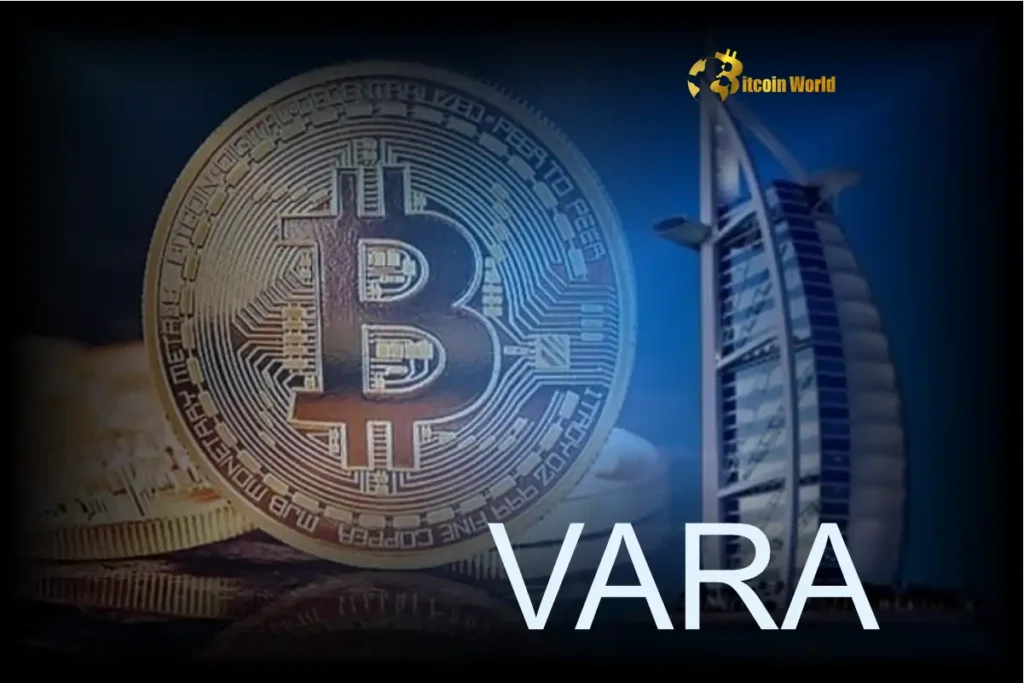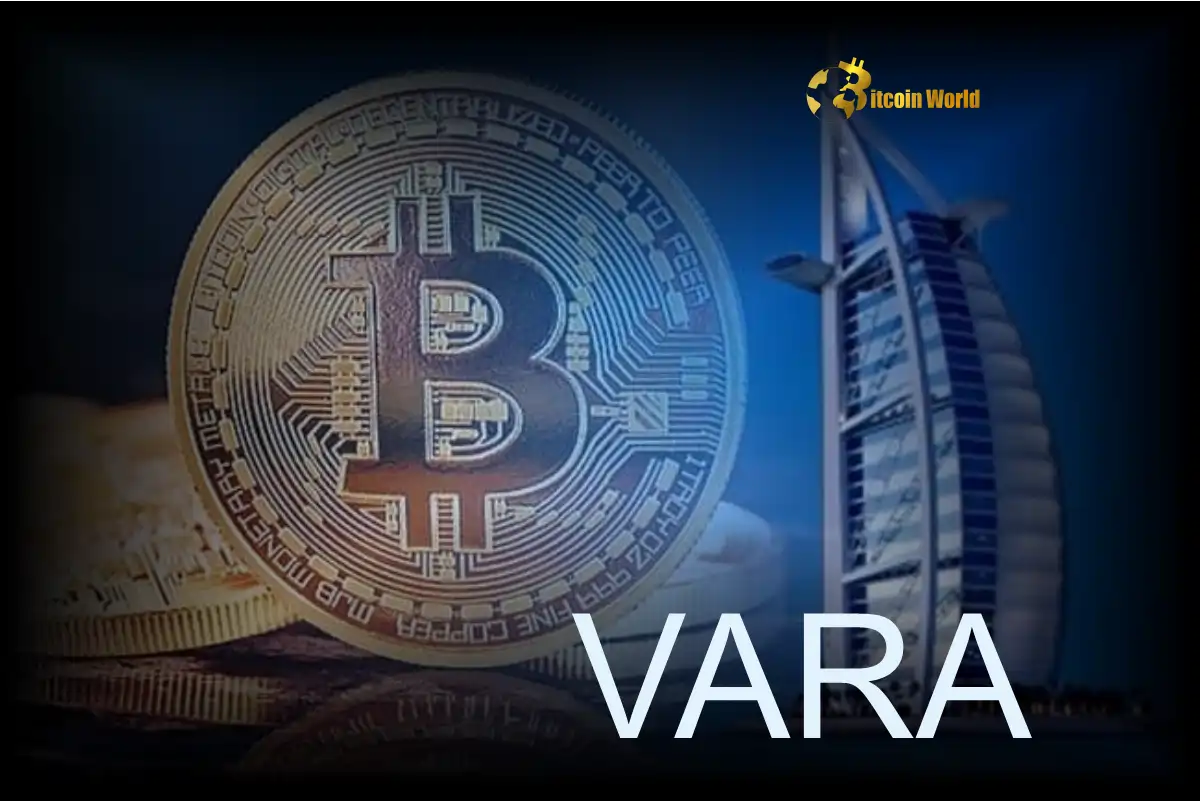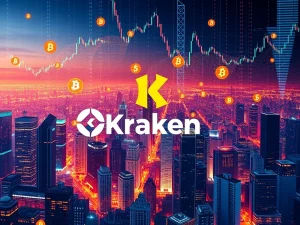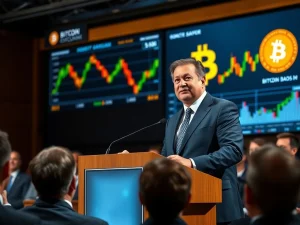Dubai Crypto Regulation: VARA Tightens Grip on Margin Trading

[ad_1]
BitcoinWorld

Dubai Crypto Regulation: VARA Tightens Grip on Margin Trading
The crypto world is always buzzing with news, and lately, a lot of that buzz has been coming from Dubai. Known for its ambition to be a global hub for innovation, Dubai is also making significant strides in establishing a robust framework for the digital asset space. The latest move generating headlines involves the Virtual Asset Regulatory Authority (VARA), Dubai’s dedicated crypto regulator. VARA is tightening its grip, particularly on a popular yet potentially risky activity: crypto margin trading. This development is a crucial part of the evolving Dubai crypto regulation landscape.
According to recent reports, VARA has updated its Broker-Dealer and Exchange Rulebooks. These aren’t just minor tweaks; they introduce stricter rules specifically targeting leverage and collateral requirements. The stated goal? To enhance regulatory oversight, improve supervision, and bring previously less-regulated sectors like broker-dealers and digital wallets under a clearer regulatory umbrella. Let’s dive deeper into what this means for the industry and participants in Dubai.
What Exactly is Dubai Crypto Regulation Doing?
Dubai crypto regulation, spearheaded by VARA, aims to create a secure and attractive environment for virtual asset businesses and investors. This isn’t their first step; VARA has been active in licensing exchanges, service providers, and defining various virtual asset activities. This latest update focuses on the specifics of how leverage and collateral are handled in margin trading, a high-stakes activity where traders borrow funds to amplify their potential gains (or losses).
Updating Rulebooks: The changes are embedded within the updated Broker-Dealer and Exchange Rulebooks. These documents are the backbone of how crypto firms operating in Dubai must conduct their business.
Focus on Leverage and Collateral: The core of the new rules is the imposition of stricter limits on the amount of leverage firms can offer and the collateral requirements traders must meet. This directly impacts the risk exposure for both the platform and the trader.
Enhancing Oversight: By defining these parameters more clearly, VARA gains better visibility and control over the risks being taken within its jurisdiction. This is crucial for market stability and preventing excessive speculation that could lead to significant losses.
This move signals VARA’s commitment to maturing the Dubai crypto market, moving beyond initial licensing to address the operational risks associated with complex trading products like margin trading.
How Do These VARA Rules Impact Crypto Margin Trading?
The direct impact of the new VARA rules is on platforms offering crypto margin trading and the traders using these services in Dubai. Leverage allows traders to control a large position with a relatively small amount of capital. While this can magnify profits, it also dramatically increases the risk of liquidation – losing your initial capital and potentially more.
Stricter rules on leverage mean platforms will likely have to reduce the maximum leverage multiples they offer. For example, if a platform previously offered 100x leverage, the new rules might cap it at a significantly lower figure, perhaps 20x or 10x, depending on the specifics VARA has defined (details often emerge after the initial announcement).
Similarly, increased collateral requirements mean traders need to put up more of their own assets to open and maintain a leveraged position. This acts as a larger buffer against losses before a margin call or liquidation occurs.
Potential Impacts:
Reduced Risk Exposure: Lower leverage and higher collateral inherently reduce the potential for catastrophic losses for individual traders and the systemic risk for the market.
Changes in Trading Strategy: Traders accustomed to very high leverage will need to adjust their strategies and risk management approaches.
Operational Adjustments for Platforms: Exchanges and broker-dealers must update their systems, risk engines, and compliance procedures to adhere to the new limits. This requires significant technical and operational effort.
Shift in Market Activity: Some high-volume, high-leverage traders might seek platforms in jurisdictions with less stringent rules, while others may adapt to the safer environment provided by Dubai crypto regulation.
This regulatory clarity, while potentially limiting for some trading styles, is often viewed positively by institutional players and those seeking a more stable and predictable market environment.
Why is Dubai Tightening Crypto Leverage Rules Now?
The decision to tighten crypto leverage rules isn’t arbitrary. It aligns with a global trend among regulators to address the risks associated with highly leveraged products in financial markets, including crypto. Several factors likely contribute to VARA’s timing:
Investor Protection: High leverage is a leading cause of significant losses for retail traders. By limiting it, VARA is actively protecting less experienced investors from taking on excessive risk.
Market Integrity and Stability: Excessive leverage can contribute to market volatility and instability, especially during periods of high stress. Reducing leverage can help mitigate these systemic risks.
Aligning with Global Standards: Many established financial jurisdictions have strict rules on leverage for derivatives and other high-risk products. By implementing similar measures, Dubai enhances its credibility as a responsible financial hub.
Supervising Under-Regulated Sectors: The updates explicitly mention improving supervision of previously under-regulated areas like broker-dealers and digital wallets. This suggests a comprehensive effort to close regulatory gaps. Broker-dealers, in particular, are central to margin trading activities.
Preventing Illicit Finance: Stronger collateral requirements and better oversight can also make it harder to use leveraged trading for illicit activities, though this is often a secondary benefit.
By addressing crypto leverage head-on, Dubai is signaling its intent to foster a sustainable crypto ecosystem built on responsible practices, not just rapid growth at any cost. This proactive approach is a hallmark of effective Dubai crypto regulation.
What are the Benefits and Challenges of Stricter VARA Rules?
Like any significant regulatory change, the updated VARA rules come with both potential benefits and challenges for the Dubai crypto ecosystem.
Benefits:
Enhanced Investor Confidence: Knowing that there are safeguards against excessive risk can make both retail and institutional investors feel more comfortable participating in the Dubai market.
Attracting Institutional Capital: Institutions often prefer regulated environments with clear rules on risk management. Stricter leverage rules can make Dubai a more attractive destination for larger players.
Reduced Systemic Risk: By limiting leverage across the board, the potential for cascading liquidations that could destabilize the entire market is reduced.
Clearer Operating Environment for Firms: While compliance requires effort, clear rules provide a predictable framework for businesses to operate within, reducing regulatory uncertainty in the long run.
Challenges:
Potential for Reduced Trading Volume: High leverage attracts a certain type of trader and trading volume. Limiting it might lead some activity to move to less regulated platforms outside Dubai.
Increased Compliance Costs: Firms must invest in technology, personnel, and processes to ensure adherence to the new leverage and collateral requirements.
Complexity of Implementation: Defining and enforcing appropriate leverage limits across various asset types and market conditions can be technically complex.
Risk of Driving Activity Underground: If regulation is perceived as too restrictive, some traders might resort to unregulated or offshore platforms, which could increase their risk rather than decrease it.
Balancing investor protection and market integrity with fostering innovation and maintaining competitiveness is a key challenge for VARA, and these new rules represent their current approach to striking that balance.
Actionable Insights: Navigating the New Dubai Crypto Landscape
Whether you are a crypto business operating in Dubai or a trader participating in the market, understanding and adapting to the new VARA rules is essential. Here are some actionable insights:
For Businesses (Exchanges, Broker-Dealers):
Review and Update Systems: Immediately assess your trading engine and risk management systems to ensure they can enforce the new leverage limits and collateral requirements.
Update Compliance Procedures: Train staff on the new rules and update internal policies and procedures for onboarding, monitoring, and risk management.
Communicate Clearly with Users: Proactively inform your users about the upcoming changes, explaining how it will affect their trading options and requirements.
Engage with VARA: Maintain open communication channels with the regulator to seek clarification and provide feedback where appropriate.
For Traders:
Understand the New Limits: Be aware of the maximum leverage you can use and the minimum collateral needed for positions on Dubai-regulated platforms.
Adjust Risk Management: With lower leverage, position sizing and stop-loss strategies become even more critical. Re-evaluate your risk tolerance.
Explore Other Products: If high leverage was central to your strategy, consider exploring other trading strategies or products available within the regulated framework.
Choose Regulated Platforms: Operating on VARA-regulated platforms offers the protection and oversight that comes with these stricter rules.
The evolving Dubai crypto regulation landscape requires continuous adaptation. Staying informed and compliant is not just a legal necessity but also a strategic advantage for building trust and operating sustainably in the region.
The Future of Crypto Under Dubai Crypto Regulation
VARA’s decision to tighten rules on crypto margin trading and crypto leverage is a significant step in the maturation of the Dubai crypto market. It reflects a commitment to building a responsible and secure ecosystem that can attract both retail and institutional participants while mitigating systemic risks. While some may find the stricter limits restrictive, they align Dubai with global best practices in financial regulation.
These VARA rules are part of a broader effort to provide clear guidelines for all virtual asset activities, from exchanges and broker-dealers to custody and advisory services. By doing so, Dubai aims to solidify its position not just as a hub for crypto activity, but as a hub for *regulated* and *trustworthy* crypto activity. The coming months will show how the market adapts to these changes and how VARA continues to refine its regulatory approach in this dynamic space.
To learn more about the latest crypto regulation trends, explore our article on key developments shaping Dubai crypto.
This post Dubai Crypto Regulation: VARA Tightens Grip on Margin Trading first appeared on BitcoinWorld and is written by Editorial Team
[ad_2]
Source link









